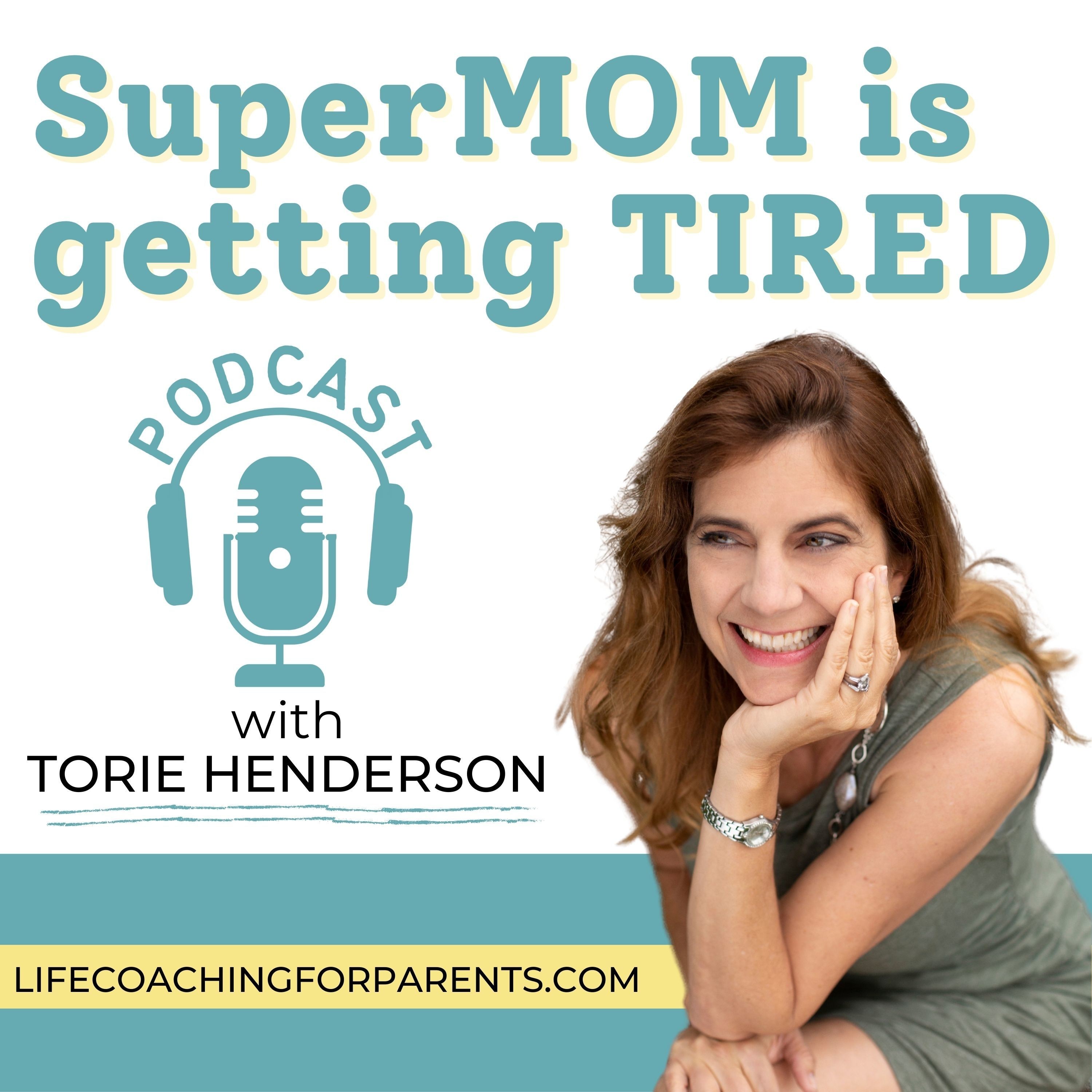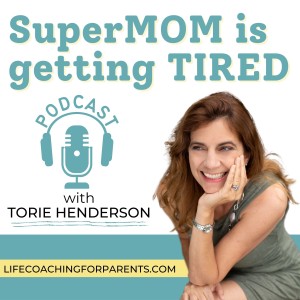
74.8K
Downloads
173
Episodes
You love being a mom but get overwhelmed, lost and resentful by all the parenting responsibilities. Listen as life coach, teacher and parent educator, Torie Henderson, answers common parenting dilemmas from hard working Supermoms. Are you exhausted from working hard all day but still feel like you haven’t accomplished anything? Do you want to feel calm, energized and in control? Then this podcast is for you.
Episodes

Tuesday Oct 06, 2020
Super competitive and a sore loser
Tuesday Oct 06, 2020
Tuesday Oct 06, 2020
Episode 83: How do I deal with my super competitive sore loser?
Torie,
“I have 2 kids, 7 year old girl and 1 year old boy. I’ve always noticed my oldest has a hard time losing when we play board games. When she started jujitsu and swimming she would get easily upset if she didn’t get it right the first time and would easily get frustrated and give up. This year is the first time she’s done a team sport. She started soccer and would be so upset when the other team scores and says “I’m the reason why our team lost” and wants to give up. I know she’s enjoying her herself but as soon as there’s some doing better or winning she wants to give up. I’ve explained to her it takes practice and hard work to get better, etc etc. But she still pouts and is a sore loser. She is especially competitive and jealous with her little brother. I’ve tried talking, explaining, spending one on one time with her etc. Today she told me “I feel like I don’t matter” and it broke my heart. This makes me frustrated, sad and exhausted. I honestly don’t know what to do.”
Ann

Parent Educator Answer:
Dr. Stuart Brown identified the competitor as one of eight play personalities in his book Play: How it Shapes the Brain, Opens the Imagination and Invigorates the Soul. Some children and adults enjoy setting goals and competing against themselves and others as a way to make an activity more interesting and exciting.
First ask yourself, is my child ENJOYING the fight, frustrations, and fierce play that goes along with being competitive? In Ann’s example, it is clear she is not.
When our child says “I don’t matter” or “You love the baby more than me” it hurts our mommy hearts. We don’t want them to think these things, so we try to convince them they aren’t true. We appeal to their logic. We explain how we really feel. We tell them their thoughts are wrong and to listen to our thoughts instead.
This doesn’t tend to work very well. Kids feel misunderstood instead of feeling seen, heard and felt.
When we see our child engaging in behavior that feels unhealthy and looks morally wrong, we spring into action. We tell them to be a gracious winner. We explain that losing is no big deal and they should focus on being a team player. We may even punish them for “misbehaving”.
Traditional parenting advice is to reward the behavior you want to see more of, and ignore, discourage, or provide consequences for the behavior you want to see less of. But this isn’t a behavior problem.
If you focused on your daughter’s behavior, she would learn to not SHOW you her feelings.
She would still have them, she would just keep them inside.
That voice inside that says “I’m a loser” or “I don’t matter” or “I know I’m going to fail so why try” will not go away. You will teach her to mold her behavior but not her emotions or inner dialogue.
You have already tried reasoning with her, you have said all the right mommy things,but it hasn’t changed her beliefs about herself. For this, we need a little life coaching.
Life Coaching Answer:
The first thing we need to do in order to help our children change their beliefs about themselves is to recognize that this isn’t a morality problem, a behavior problem, or a parenting problem. There isn’t anything you did wrong to create this belief in her.
We all pick up erroneous thinking. For a while, I had the mantra “I can’t be me.” Who else am I supposed to be? It makes no sense, but I picked it up and carried it with me for the first few decades of life. I also had the mantra, “If I know I’m going to fail, why try?” It wasn’t until my life got really, really boring that I decided to change it.
Life coaching helps you discover the beliefs that need changing, and helps you change them to ones more aligned with your values.
There are correlations between unhealthy competitive behavior and early trauma, hospitalizations, severe illness, or separation from a parent. Life is messy and things happen. I didn’t have any early traumatic experiences but I still picked up some awful beliefs about myself. We cannot prevent our children from negative emotions or experiences, nor should we.
What you can do, is recognize it’s her issue not yours and help your daughter create a different identity.
One of many things I love about kids is they often tell you exactly what they are thinking. In the example of Ann’s daughter, she comes right out and says, “I don’t matter”.
Your daughter feels like she doesn’t matter. Who knows where she picked up that idea? Kids pick up all sorts of crazy things. Almost every client I’ve ever talked to has had a core belief that they are unworthy. The key is being aware enough to notice you are believing unhealthy thoughts, and then learn how to disbelieve them.
We want to make it really hard for her to continue to believe that thought. We can do that in three ways.
- Help her identify as a winner.
- Give her the attention and affection she craves.
- Help her discharge negative emotions.
- When a child wants to be in charge, in control, to be the best, to win, to have the most, they are trying to make themselves feel better. Let’s give it to them! Create a game where you lose, again and again and again. Purposefully make yourself “the loser”. Act upset. Let’s say you are racing up the stairs and she beats you. Be dramatic about your failures. Playfully keep trying: “This time FOR SURE I’m going to beat you.” “This isn’t FAIR!” “I can’t STAND this.” Watch for your child’s laughter and delight. When your child identifies YOU as the obvious loser, she has no choice but to identify herself as a winner.
2. Use her competitiveness to fill up her love tank. Right now, every time you fill up her love tank with attention and affection, she drains it with these negative beliefs she is carrying around. Play games where you are chasing her with hugs and kisses. “I need 5 hugs every day and you’ve only given me 1. I’m coming to get you and steal another hug. You can’t hide from me! I’m the hug monster!”
Every time she does something that her baby brother can’t do, you reward her with playful affection. “You buckled your seatbelt all by yourself! You get 5 kisses!”
When we are desperately trying to give attention and affection to our kids, it makes it hard for them to believe they don’t matter or they aren’t getting enough love.
3. Sometimes we just need to get the yuck out. Your daughter’s been carrying around a lot of negative emotion and she might look for opportunities to release it. Maybe you pour orange juice instead of apple and she has a meltdown on the kitchen floor. Maybe her team loses and she blames herself. Maybe a referee makes a bad call and she goes into a tirade against him. See these emotional meltdowns as a healthy discharge of negative emotion rather than misbehavior. Be there with her. Hold her. Allow her to feel devastated, like the world is unfair. Reflect what you see and hear her saying, “It’s so hard to lose a game when you tried so hard to win.” Do hold your boundaries but do it with kindness, “I won’t let you back in the game until you’ve apologized to your teammate for yelling at her.”
What your child needs is your steady confidence that her life will be good. To know that these emotions are real and valid, but temporary. That you aren’t going anywhere. That her emotions matter to you.
Supermom Kryptonite - Believing the first six years of your child’s life determine their future. Have you heard these statistics?
“90% of your child’s brain is developed by age 5!”
“A child’s experiences in the early years (positive or negative, nurtured or neglected) have long term impacts on the child’s health, ability to learn and succeed.”
“The amount of quality care, interaction and stimulation they receive in early childhood determines which brain connections develop and last for a lifetime.”
Statements like these turned me into a hyper-vigilant, freaked out, perfectionistic and very stressed out mom who would not take a break! Being with my baby at all times, giving the right amount of nurture and stimulation, saying and doing all the right things, felt like a life or death situation.
I believed my child’s success was in my hands and I sacrificed my mental, emotional and physical health for it.
One of the great byproducts of life coaching for me was realizing how easy it can be to change one’s beliefs, feelings and actions. Discovering how to use life coaching to create a great life, took all the pressure off of ME having to do everything perfectly in order for my kids to be happy and successful.
Nothing is set in stone. Neuroplasticity is amazing and learning how to change your brain in any direction you want is so empowering! If my kid is too perfectionistic or anxious and it’s stressing him out, he can change it anytime he wants! If my kid struggles to learn, but wants to get good grades, she can hire a coach to help make it happen.
The tools of life coaching are amazingly powerful. When we start making important and helpful changes in our own lives, it gives us the confidence to see how our children can do the same.
Believing that your kids brains are locked in by age 6 is today’s Supermom Kryptonite.
Supermom Power Boost - Get your kids on the same team
When your child is competitive with their sibling, try to find opportunities to get them on the same team by making yourself the loser.
“You BOTH beat me to the car! I lose and you WON? Oh, MAN!”
“Let’s play the silent game. Who can be quietest the longest? Oh shoot, I just TALKED!”
Lay down on the floor to wrestle with them both. Only let them pin you if they are working together. Then say, “Oh, no! You pinned me to the ground! Together you are too strong for me.”
Another way to cope with sibling jealousy is to be mindful of balancing your attention.
Older children constantly hear us say, “I’ve got to get the baby.” We stop playing to pick up the baby. We ask our kids to hurry up so we can tend to the baby.
Make sure your daughter overhears you saying to the baby, “I’m sorry baby, you’ll have to wait, your sister and I are playing now.” or “I’ll get you in a minute baby, I need 5 more hugs from your sister first.”
Quote of the Day:
“The sign of great parenting is not the child’s behavior. The sign of truly great parenting is the parents behavior.” Andy Smithson

No comments yet. Be the first to say something!